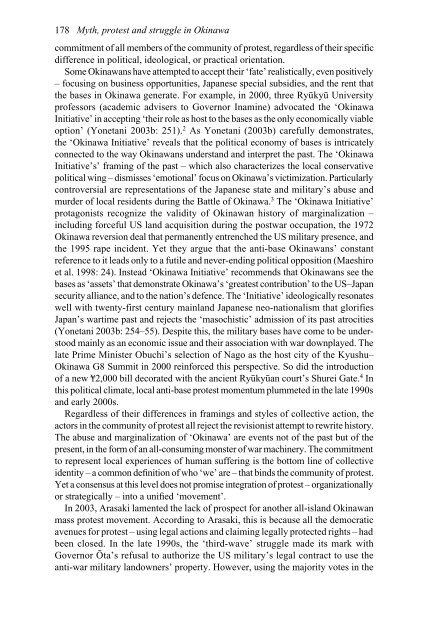Myth, Protest and Struggle in Okinawa
Myth, Protest and Struggle in Okinawa
Myth, Protest and Struggle in Okinawa
You also want an ePaper? Increase the reach of your titles
YUMPU automatically turns print PDFs into web optimized ePapers that Google loves.
178 <strong>Myth</strong>, protest <strong>and</strong> struggle <strong>in</strong> Ok<strong>in</strong>awa<br />
commitment of all members of the community of protest, regardless of their specific<br />
difference <strong>in</strong> political, ideological, or practical orientation.<br />
Some Ok<strong>in</strong>awans have attempted to accept their ‘fate’ realistically, even positively<br />
– focus<strong>in</strong>g on bus<strong>in</strong>ess opportunities, Japanese special subsidies, <strong>and</strong> the rent that<br />
the bases <strong>in</strong> Ok<strong>in</strong>awa generate. For example, <strong>in</strong> 2000, three Ryūkyū University<br />
professors (academic advisers to Governor Inam<strong>in</strong>e) advocated the ‘Ok<strong>in</strong>awa<br />
Initiative’ <strong>in</strong> accept<strong>in</strong>g ‘their role as host to the bases as the only economically viable<br />
option’ (Yonetani 2003b: 251). 2 As Yonetani (2003b) carefully demonstrates,<br />
the ‘Ok<strong>in</strong>awa Initiative’ reveals that the political economy of bases is <strong>in</strong>tricately<br />
connected to the way Ok<strong>in</strong>awans underst<strong>and</strong> <strong>and</strong> <strong>in</strong>terpret the past. The ‘Ok<strong>in</strong>awa<br />
Initiative’s’ fram<strong>in</strong>g of the past – which also characterizes the local conservative<br />
political w<strong>in</strong>g – dismisses ‘emotional’ focus on Ok<strong>in</strong>awa’s victimization. Particularly<br />
controversial are representations of the Japanese state <strong>and</strong> military’s abuse <strong>and</strong><br />
murder of local residents dur<strong>in</strong>g the Battle of Ok<strong>in</strong>awa. 3 The ‘Ok<strong>in</strong>awa Initiative’<br />
protagonists recognize the validity of Ok<strong>in</strong>awan history of marg<strong>in</strong>alization –<br />
<strong>in</strong>clud<strong>in</strong>g forceful US l<strong>and</strong> acquisition dur<strong>in</strong>g the postwar occupation, the 1972<br />
Ok<strong>in</strong>awa reversion deal that permanently entrenched the US military presence, <strong>and</strong><br />
the 1995 rape <strong>in</strong>cident. Yet they argue that the anti-base Ok<strong>in</strong>awans’ constant<br />
reference to it leads only to a futile <strong>and</strong> never-end<strong>in</strong>g political opposition (Maeshiro<br />
et al. 1998: 24). Instead ‘Ok<strong>in</strong>awa Initiative’ recommends that Ok<strong>in</strong>awans see the<br />
bases as ‘assets’ that demonstrate Ok<strong>in</strong>awa’s ‘greatest contribution’ to the US–Japan<br />
security alliance, <strong>and</strong> to the nation’s defence. The ‘Initiative’ ideologically resonates<br />
well with twenty-first century ma<strong>in</strong>l<strong>and</strong> Japanese neo-nationalism that glorifies<br />
Japan’s wartime past <strong>and</strong> rejects the ‘masochistic’ admission of its past atrocities<br />
(Yonetani 2003b: 254–55). Despite this, the military bases have come to be understood<br />
ma<strong>in</strong>ly as an economic issue <strong>and</strong> their association with war downplayed. The<br />
late Prime M<strong>in</strong>ister Obuchi’s selection of Nago as the host city of the Kyushu–<br />
Ok<strong>in</strong>awa G8 Summit <strong>in</strong> 2000 re<strong>in</strong>forced this perspective. So did the <strong>in</strong>troduction<br />
of a new ¥2,000 bill decorated with the ancient Ryūkyūan court’s Shurei Gate. 4 In<br />
this political climate, local anti-base protest momentum plummeted <strong>in</strong> the late 1990s<br />
<strong>and</strong> early 2000s.<br />
Regardless of their differences <strong>in</strong> fram<strong>in</strong>gs <strong>and</strong> styles of collective action, the<br />
actors <strong>in</strong> the community of protest all reject the revisionist attempt to rewrite history.<br />
The abuse <strong>and</strong> marg<strong>in</strong>alization of ‘Ok<strong>in</strong>awa’ are events not of the past but of the<br />
present, <strong>in</strong> the form of an all-consum<strong>in</strong>g monster of war mach<strong>in</strong>ery. The commitment<br />
to represent local experiences of human suffer<strong>in</strong>g is the bottom l<strong>in</strong>e of collective<br />
identity – a common def<strong>in</strong>ition of who ‘we’ are – that b<strong>in</strong>ds the community of protest.<br />
Yet a consensus at this level does not promise <strong>in</strong>tegration of protest – organizationally<br />
or strategically – <strong>in</strong>to a unified ‘movement’.<br />
In 2003, Arasaki lamented the lack of prospect for another all-isl<strong>and</strong> Ok<strong>in</strong>awan<br />
mass protest movement. Accord<strong>in</strong>g to Arasaki, this is because all the democratic<br />
avenues for protest – us<strong>in</strong>g legal actions <strong>and</strong> claim<strong>in</strong>g legally protected rights – had<br />
been closed. In the late 1990s, the ‘third-wave’ struggle made its mark with<br />
Governor Ōta’s refusal to authorize the US military’s legal contract to use the<br />
anti-war military l<strong>and</strong>owners’ property. However, us<strong>in</strong>g the majority votes <strong>in</strong> the
















